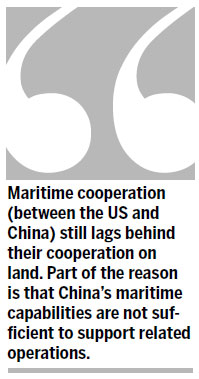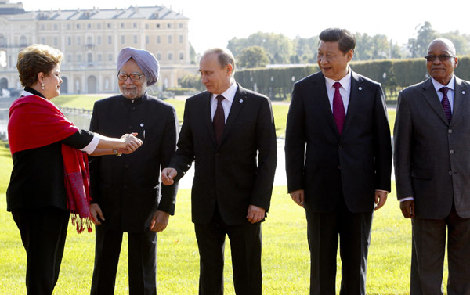Don't ignore the soft content
Updated: 2013-09-06 07:05
By Su Xiaohui (China Daily)
|
||||||||
Efforts to build China into a sea power include pursuing 'converging interests' with others in oceanic development
At a study session with members of the Party leadership on July 30, China's top leader Xi Jinping championed efforts to build the country into a maritime power. His remarks aroused concerns that China's policy to address disputes in the East China Sea and South China Sea has changed. There are suspicions that China intends to rely on its military capabilities rather than peaceful approaches, such as dialogue and negotiation, to deal with the tensions, and that this will raise the risk of potential clashes, which would not only be against the interests of countries in the region, but also the interests of the United States.
As a rising power, China's current naval capabilities do not match its development level. The strengthening of its capabilities and increasing expenditure on building itself into a maritime power have not exceeded the normal level for a country at its stage of development, and accordingly, China should not be questioned or blamed.
In the context of the increasing uncertainties in the East China Sea and South China Sea, China's stance remains defensive and restrained.
China is not trying to utilize military strength to gain an advantage in resolving territorial disputes with neighboring countries. China has reaffirmed on various occasions that it persists in peaceful approaches such as negotiation and dialogue.
The problem is China's policies have been misinterpreted and distorted. Some media deliberately distort China's policies in order to define it as a destabilizing factor in the region. They ignore the "soft content", which is the core of China's policies.

When Xi advocated China becoming "a maritime power", he also emphasized that China would pursue "converging interests" with other countries. He said that China would make overall plans and take all factors into consideration, which means that China is acting in a responsible way to become a maritime power.
China's intention was also clearly outlined in the report former leader Hu Jintao delivered at the opening ceremony of the 18th CPC National Congress. The report said China's maritime policy should enhance its capacity to exploit marine resources, develop its marine economy, protect marine ecologies, resolutely safeguard the country's maritime rights and interests, and build itself into a maritime power.
Two things can be concluded from the report. The first is that China's dream of being a maritime power is a comprehensive design instead of pure military ambition. It not only addresses the protection of sovereignty but also stresses achieving joint development and win-win situations with other countries. The concept of a maritime power does not equate to a power with overwhelming military capability that can defeat other parties according to its will. That is the consideration for which the report included the content in the eighth part on "making great efforts to promote ecological progress" instead of the ninth part addressing accelerating the modernization of national defense and the armed forces.
The second message from the report is that China attaches more importance to development and cooperation rather than confrontation and conflict. China understands that neighboring countries worry about the sea disputes and it strives to promote cooperation among related parties in order to ease tensions and maintain regional stability. China has made positive moves to reassure its neighbors. Foreign Minister Wang Yi proposed three suggestions for dealing with the South China Sea disputes during his visit to Thailand last month.
Meanwhile, the United States should be aware that China will not be able to catch up with the US' maritime power for decades. According to a recent analysis by Russian experts, it will take at least 20 years for China to become a maritime power. China is sober-minded; it has no intention of challenging the US. Based on this, the US should not overreact to China's maritime development and treat it as a rival.
Even though both countries have not yet built up strong enough mutual trust to accommodate in-depth military exchanges, they can still work together in a number of non-sensitive areas that benefit regional countries.
China and the US have made some progress in collaborative efforts in areas such as disaster relief, response and warning. In 2012, they jointly funded and participated in an urban search and rescue training exercise aimed at improving the capacity of members of the Association of Southeast Asian Nations. USAID and the China Earthquake Administration also co-funded a regional earthquake response exercise in Indonesia.
However, maritime cooperation still lags behind their cooperation on land. Part of the reason is that China's maritime capabilities are not sufficient to support related operations. With the development of its navy, China will be able to become a qualified partner for maritime cooperation with the US.
China and the US have cooperated in anti-piracy operations in the Asia-Pacific several years ago. Unfortunately, these efforts were not sustained and little progress has been achieved since. Now, with China's efforts to become a maritime power, it may be the right time for both sides to resume and renew their maritime cooperation.
The author is deputy director of the Department of International and Strategic Studies at the China Institute of International Studies.
www.chinausfocus.com
(China Daily USA 09/06/2013 page15)

 Holder Murray stunned by Wawrinka in US Open quarters
Holder Murray stunned by Wawrinka in US Open quarters
 China, Russia a step closer on gas supply
China, Russia a step closer on gas supply
 18-year-old panda conceives triplets
18-year-old panda conceives triplets
 Testing times for G20 leaders
Testing times for G20 leaders Homemade choppers make aerobatic stunt debut
Homemade choppers make aerobatic stunt debut
 World-class partners bring NBA global games to Chinese fans
World-class partners bring NBA global games to Chinese fans
 Shanghai's visa-free policy lifts tourism
Shanghai's visa-free policy lifts tourism
 Panda twin cub born at Atlanta Zoo
Panda twin cub born at Atlanta Zoo
Most Viewed
Editor's Picks

|

|

|

|

|

|
Today's Top News
Beijing's new product briefing a first for Apple
China, Russia a step closer on gas supply
Brazil asks for apology from US on spying
Japan to test wall for leaking water
Low-budget education abroad for working-class
Shanghai's visa-free policy lifts tourism
Films aim for success abroad
Xi vows economic reform at G20 summit
US Weekly

|

|





